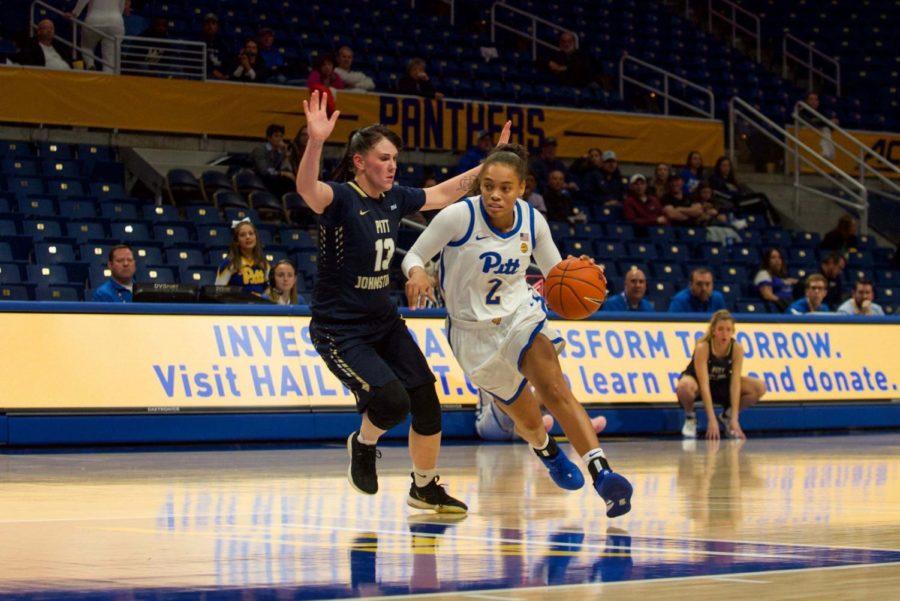White welcomes new year in women’s basketball rebuild
Redshirt senior guard Aysia Bugg rushes past Pitt-Johnstown’s Alli McGrath. Bugg is one of only two current players who have seen regular starting minutes in their career.
November 4, 2019
Leaves crunch underfoot, temperatures drop and basketballs hit the hardwood — November is finally here, meaning that Pitt women’s basketball will open their second season under head coach Lance White this month. White is charged with the tall task of rebuilding Pitt’s struggling women’s basketball program and has already gotten to work revamping the middling Panthers.
The 2018-19 season was a difficult time for the redeveloping Panthers. They went 11-20 overall and 2-14 in ACC conference play — good for second to last in the conference — and were blown out in many of those games. In ACC play, they lost a total of thirteen games by more than 10 points, five of them by more than 20 and three by more than 30. They even lost by 56 in one game — the conference opener against perennial power Notre Dame.
The roster that returns this season looks almost nothing like the team that ended last season. Four starters left last season, with Cassidy Walsh, Danielle Garven and Kauai Bradley graduating and junior point guard Jasmine Whitney choosing to “step away from the team.”
Additionally, three reserve players chose to transfer, including sophomore guard Pika Rodriguez, first-year guard Tehya Lyons and sophomore forward Jaala Henry. Center Kalista Walters graduated, and guard Alayna Gribble retired from basketball after suffering multiple concussions.
Altogether, almost half of the 2018-19 roster did not return.
The 2019-20 Pitt women’s basketball team enters this season with an abundance of new faces and a lack of experience. There are only two players that have seen regular starting minutes in their career, redshirt senior guard Aysia Bugg and junior center Cara Judkins.
Bugg is in her sixth year at Pitt after redshirting her senior year due to a torn ACL and gaining another year of eligibility from the NCAA after being diagnosed with blood clots in her lungs. She is by far the Panthers’ most talented and experienced player and has the stats to prove it, as one of two active ACC players with at least 700 career points, 350 assists and 300 rebounds.
Judkins doesn’t have the more than a half decade of experience that Bugg boasts, but she is still one of the program’s few veterans. She started 25 of 31 games, and has carved out a niche in the paint on both ends of the floor, averaging 6.6 points, 5.6 rebounds and 1.2 blocks per game.
Those two account for all of the experience the Panthers have going into this season, but that doesn’t mean they will catch any breaks once it begins.
All of the new players will be trusted with plenty of playing time, given Pitt’s short 12-player roster. And of those 12 players, only nine are both healthy and eligible to start the season.
Despite the obvious obstacles this team has in front of them, this transition year can be an essential part of the foundation for White’s tenure as head coach.
It will all start with his first full recruiting class — the three guards Dayshanette Harris, Amber Brown, Emy Hayford and two forwards Rita Igbokwe and Cynthia Ezeja. Of these players, it appears that Harris and Brown will start and rarely leave the floor this season. Harris is a combo guard and her playmaking will provide a fine complement to Bugg’s scoring in her final year.
Brown is a 6-foot guard that will also assume some forward roles. Her talent lies around the basket with her ability to drive, score in the lane and grab rebounds, of which she tallied 19 in Friday’s exhibition game against Pitt-Johnstown.
Of the remaining first-years, Hayford, who hails from the Netherlands, will come off the bench, but has strong scorer’s instincts. Igbokwe is raw, but her 6-foot-4 frame provides a physical match for the taller centers and forwards of the ACC. Ezeja, a 6-foot-3 Greece native, will eventually play the same role as Igbokwe, but will most likely be redshirting this season.
To provide desperately needed experience, Pitt added two transfers, junior Gabbie Green and junior Marcella LaMark. Green came from South Plains College in Texas and can shoot the ball well, averaging 17 points in league play last season, shooting 46.7% from the floor and 30.2% from behind the arc.
Because LaMark transferred mid-season from Texas Tech, she will have to wait until January to begin play as she finishes sitting out a year. Her last game action came in junior college at Central Florida, where she posted averages of 13.1 points, 9.1 rebounds and 2.0 blocks per game in her sophomore season.
Among Pitt’s thin rank of returners are junior Kyla Nelson and sophomores Ismini Prapa and Jahsyni Knight. Nelson can shoot from behind the arc, but is currently recovering from surgery after being diagnosed with cancer. Meanwhile, Prapa will be tasked with using her jump shot to space the floor as Knight provides a solid target for Bugg and Harris to find running the floor for easy layups.
For this season to be a successful one, the Panthers will need to use the non-conference schedule to correct deficiencies that will be exploited in ACC play, such as unnecessary turnovers, missed defensive assignments and bad shots.
The bad news is that the Panthers are inexperienced and undersized, and their talent will be overmatched in almost every game this season. The good news is that not much is expected of them, but in order to have a successful season, the little things will have to be major priorities. Strong effort, hard defense and the construction of a positive culture are essential to a productive year and helping White recruit for the future.








